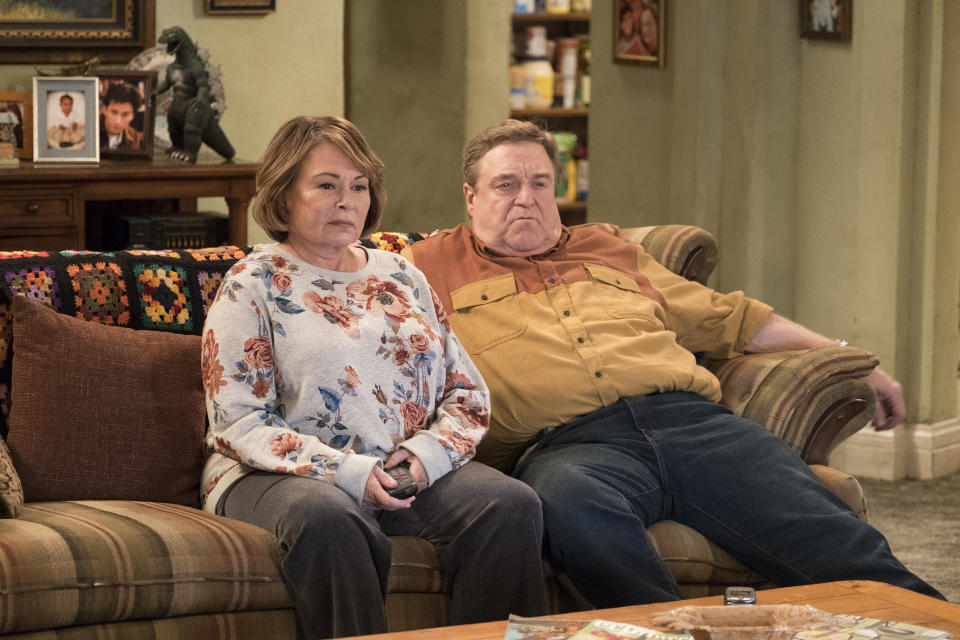'Roseanne' is back, and it's become a pro-Trump platform
Roseanne returns on Tuesday night for a 10th season no one could have predicted. Having vanished in 1997 with, among other things, the death of John Goodman’s Dan Conner, the new Roseanne opens with the whole Conner clan miraculously intact as the show picks up 21 years later. The series doesn’t just acknowledge the time that has passed — it makes it central to the drama that always tinged this show’s comedy. In 2016, we are told, Roseanne Conner voted for Donald Trump, and her sister, Jackie (Laurie Metcalf), voted for — well, someone else. As the show restarts, the sisters haven’t spoken for a year.

The presentation of these details is both blunt (Jackie tells Roseanne she “voted for the worst person in the world”) and coy (the show never utters the names “Trump” or “Hillary” but rather “that man” and “that woman”: Why?). A lot of media coverage has been given to this plot point as well as its real-life one: Roseanne Barr’s own loud-and-proud Trump endorsement. For all the pearl-clutching being done by gasping commentators scandalized that Barr, Former Champion of the Working Class, has defected from the ranks of the Democratic Party (after all, Roseanne did attend Bill Clinton’s 1993 inauguration), Roseanne Conner as a Trump voter makes as much sense as anything now. It’s easy to imagine the Conner household being swept up in “drain the swamp” fervor during election time.
What makes less sense is having Roseanne Conner now, in 2018, impervious to buyer’s remorse. In the opening scene on Tuesday, Roseanne and Dan sit at the kitchen table counting out their prescription pills — their lousy new health care coverage only affords them, as Dan winsomely puts it, “half the drugs for twice the price.” Since these residents of Lanford, Ill., presumably benefited from Illinois’s quick-witted attempts to protect the Affordable Care Act from being completely destroyed by Trump forces, you’d think a woman as savvy as Roseanne would have figured out a full year into Trump’s presidency that her man is just refilling the swamp. Not at all, unfortunately.
Where Jackie seems genuinely shaken by the election result and its aftermath, Roseanne is far more cavalier, and here the series gets at something few TV shows — and I’m including news programming here — are willing to point out, which is that most Trump voters still seem unconcerned about the danger that the rest of the country believes this new president poses to everyone. For Roseanne Conner, Trump is just the latest manifestation of her let’s-shake-things-up approach to life. And there’s a lot to shake up too. If the new Roseanne sometimes feels a little stiff — as though it hasn’t quite settled on its tone yet — it can probably be ascribed to two behind-the-scenes influences. The first, of course, is Roseanne herself: Barr is nothing if not the author of her own story, and she’s made a career, if not a legend, out of blending the edges where Roseanne Barr and Roseanne Conner merge.
But the second influence is Sara Gilbert’s. She was the one who was instrumental in reviving Roseanne. She’s the one who had the idea and pitched it to both Barr and the network. It’s therefore not a surprise that Gilbert’s character gets the central subplot in the new series, which revolves around Darlene returning to Lanford to restart her life as a single mom. One significant newcomer to the cast is Darlene’s son, Mark, played by Ames McNamara. He likes to dress in clothes traditionally viewed as feminine, which provides the opportunity for his grandmother Roseanne to — very implausibly, I should add — demonstrate she’s not so conservative that she scorns or condemns the boy. (Interestingly, the co-stars themselves can’t seem to agree whether this character is gender-fluid: In a Hollywood Reporter interview, Barr says Mark is gender-fluid, but Gilbert disagrees: “But he’s not gender-fluid: He just likes to dress in more feminine clothing, is where we landed.” This may be a small warning sign that the show does not have a fix on either this character or the show’s take on him.)
There are numerous laughs in these new episodes (I’ve seen three of them), and Metcalf and Gilbert are very effective in all their scenes. (I’m reserving judgment on Goodman, who thus far seems to be reacquainting himself with the great performances he used to give regularly, as though he feels he still has to work out some of the kinks.) Yes, the show has found a clever way to include both women who played Becky, Lecy Goranson and Sarah Chalke.
As for Roseanne herself, she remains what she’s always been: endlessly watchable, a great entertainer who always carries everything we know about her private life into her work onscreen. During the initial run of Roseanne, I used to regularly compare her to Elvis Presley as a culture-influencing entertainer. Now I’d say she’s more like Black Panther: ruling over her kingdom (queendom?) with serene effortlessness, taking for granted that monarchy, like sisterhood, is powerful.
Roseanne airs Tuesdays at 8 p.m. on ABC.
Read more from Yahoo Entertainment:

